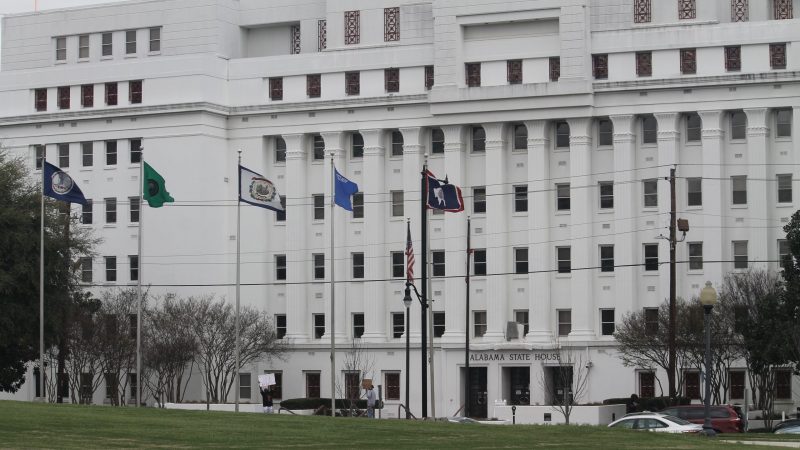Bill revamping ethics law advances in the legislature
The Alabama House advanced a bill Tuesday which would make changes to the state ethics law. Proponents say it provides some necessary clarification, but opponents, including Attorney General Steve Marshall, say it’s an attempt to weaken the law.
“There have been some disagreements between all these parties about just how far the law should go and some specifics in terms of criminality,” said Todd Stacy, host of Capitol Journal on Alabama Public Television.
Stacy discussed that bill and other legislative action this week.
Ethics rewrite
Republican Rep. Matt Simpson, the sponsor of the legislation, said the current ethics law is often confusing and convoluted for the estimated 300,000 public employees and officials who fall under it. He said the goal was to provide clearer definitions.
Attorney General Steve Marshall’s office said in a statement that he “strongly opposes this proposed rewrite of our ethics laws.”
The bill would raise the gift ban limit to public officials and employees to $100 per occasion and $500 per year. Current law prohibits public officials and employees from receiving a “thing of value” from a lobbyist or person who employs a lobbyist but allows exemptions for items of minimal value, now defined as less than $33.
“Right now both the attorney general and the ethics commission director are publicly opposed to the bill,” Stacy said. “It wouldn’t surprise me if you saw some negotiations about some changes as it goes to the Senate.”
Expanding medical cannabis licenses
It’s been nearly three years since Alabama established a medical cannabis program.
“Yet no products are at market and we’re not really even close,” Stacy said.
That’s because the Alabama Medical Cannabis Commission has been mired in multiple lawsuits over the licensing process for growers, processors and distributors of medical cannabis. In response to this, Republican Sen. David Sessions has introduced a bill that would increase the number of licenses available.
“As the sponsor said just to get it out of court. Say, ‘Fine, here’s a license. We’ll let the free market dictate this,’” Stacy said. “Members of the legislature are frustrated that a bill that they passed, bipartisan, [with] pretty overwhelming support, has not actually led to results.”
A Wednesday Senate committee hearing on the proposal brought out strong opposition from companies which have already been granted licenses. The committee did not vote on the plan, which Stacy said is not unusual.
“As long as there’s time left in the session, which there is, the members of the committee have time to sort of digest and get that feedback so they’re not forced to take a vote on a bill maybe they haven’t completely digested,” Stacy said.
General Fund budget
A Senate committee Wednesday passed a $3.3 billion General Fund budget for the next fiscal year, the largest in Alabama history. It’s about $65 million more than what Gov. Kay Ivey proposed earlier this year. Lawmakers also approved $210 million in additional spending for the current fiscal year.
“The reason for that is as time goes by we have more accurate estimates on what the revenues are going to be,” Stacy said. “So that’s good news. That means the economy is growing and the General Fund is growing.”
The spending plan more than doubles to $50 million dollars the amount of money allotted for debt service on prison construction. The bill increases prison construction funds by $150 million.
The proposed budget tops up funding for the Alabama Department of Mental Health, including $18.2 million for the Taylor Hardin Secure Medical Facility in Tuscaloosa. That facility had been involved in a lawsuit over a lack of staffing.
“I know a lot of folks in the mental health community are very happy to see those provisions in the budget,” Stacy said.
Includes reporting from the Associated Press
Reporters’ notebook: The Olympics closing ceremony is way more fun than you’d think
Olympics opening ceremonies tend to get more love than their closing counterparts. But a pair of NPR reporters who watched both in Italy left with a newfound appreciation for the latter.
Northeast readies for a major winter storm, with blizzard warnings in effect
New Jersey through Massachusetts could see 2 feet of snow. New York City's mayor said the city had not "seen a storm like this in a decade."
Mexican army kills leader of Jalisco New Generation Cartel, official says
The Mexican army killed the leader of the powerful Jalisco New Generation Cartel, Nemesio Rubén Oseguera Cervantes, "El Mencho," in an operation Sunday, a federal official said.
Ukraine’s combat amputees cling to hope as a weapon of war
Along with a growing number of war-wounded amputees, Mykhailo Varvarych and Iryna Botvynska are navigating an altered destiny after Varvarych lost both his legs during the Russian invasion.
University students hold new protests in Iran around memorials for those killed
Iran's state news agency said students protested at five universities in the capital, Tehran, and one in the city of Mashhad on Sunday.
Pakistan claims to have killed at least 70 militants in strikes along Afghan border
Pakistan's military killed at least 70 militants in strikes along the border with Afghanistan early Sunday, the deputy interior minister said.







